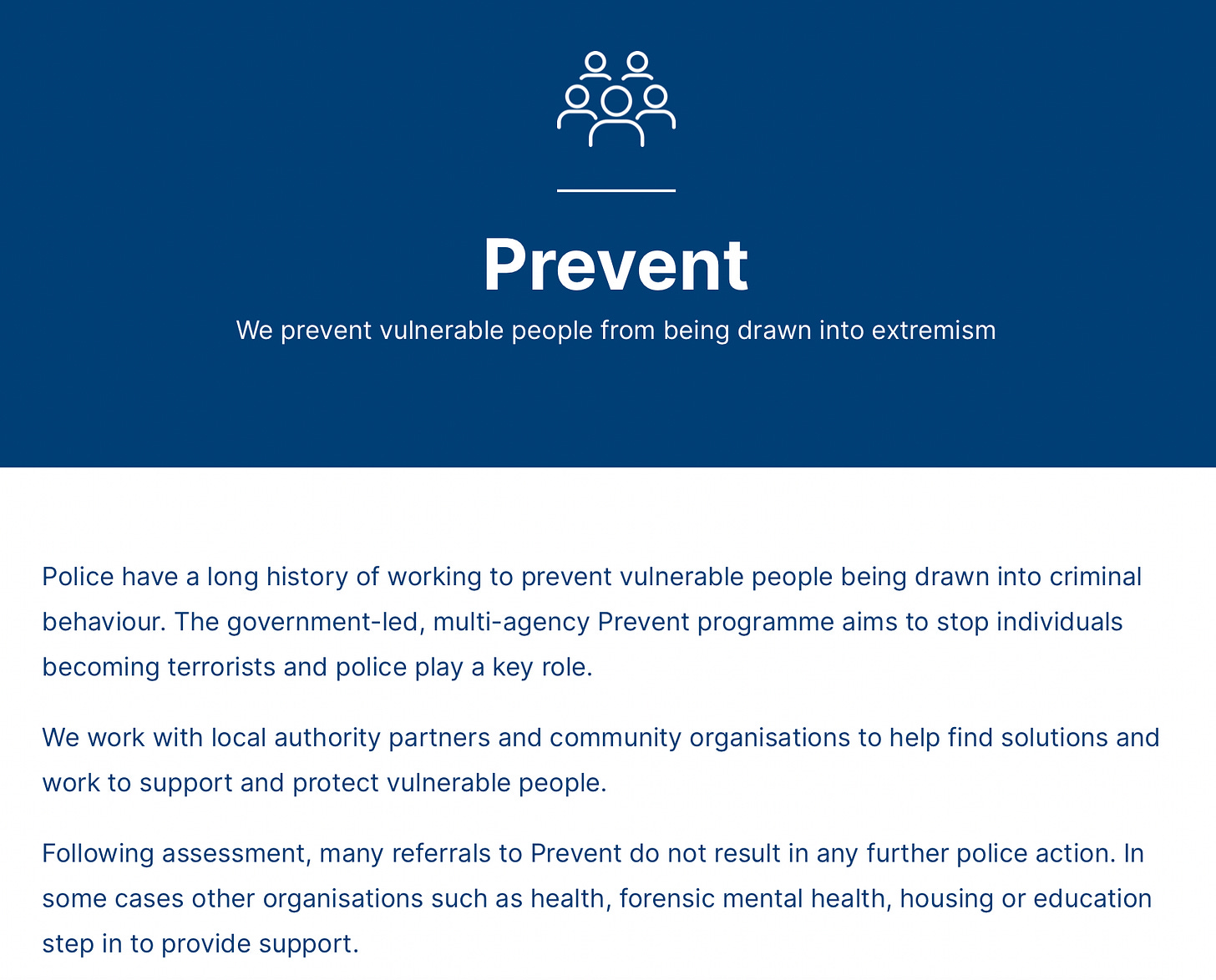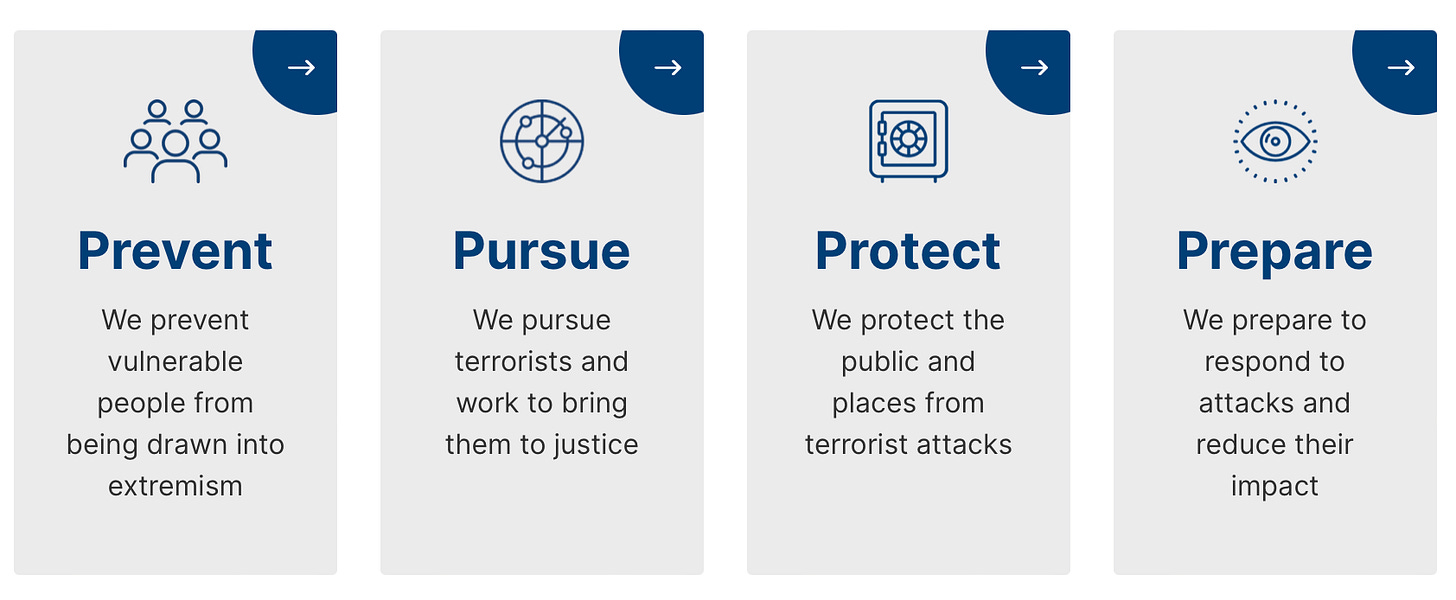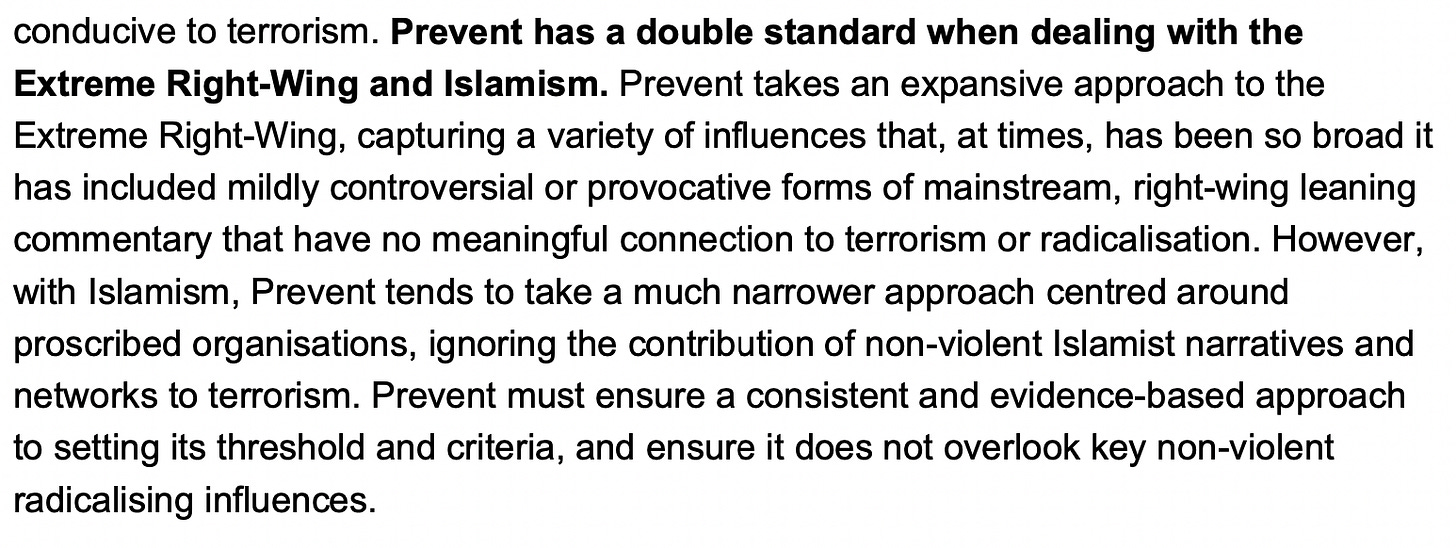What is Prevent actually preventing?
Soppy liberalism has pervaded the criminal justice system, with devastating consequences
Last month the Home Office announced that it would be slashing its budget for Prevent (the counter-terrorism body) in London. The budget will decrease from £4.5m last year to about £2m from April 2025.
As you can imagine not everyone was delighted about the decision. Referrals to Prevent were up by 13 percent between October 7 and December 31 last year compared with the same period in 2022, so you might expect the funding to head in the other direction.
The paradox
However, it’s not especially clear that Prevent is fulfilling its namesake. Read enough news stories about terrorism and a pattern emerges: someone has been reported to Prevent and/or on its radar, but Prevent isn’t sufficiently concerned - and that someone goes on to do something dreadful.
A reminder of this pattern emerged last week, in the inquest into the murders of Joseph Ritchie-Bennett, James Furlong and David Wails, who were stabbed to death in Reading in 2020 by Khairi Saadallah, a Libyan asylum seeker. It found that their deaths were “probably avoidable”, with multiple services failing them, including Prevent and MI5.
Warning signs
In Saadallah’s case, as well as others, it’s hard to understand how authorities missed the writing on the wall; that an individual was going to do something terrible. Since arriving in Britain in 2012 (when he lied about his background as a former member of an extremist Islamic militia), Saadallah was repeatedly arrested and convicted of various offences, such as theft and assault. In prison spell he told staff he was part of Islamic State and wanted to "blow up" Britain.
Saadallah was the subject of “dozens of intelligence reports which showed a pattern of fighting, threats to staff, self-harming and suspected drug use, along with references to extremism.” You feel he could have been running around in a t-shirt saying “I love terrorism!” and still been left alone by the officials meant to protect us.
Deportation failures
Two weeks before the murders, Saadallah was released from prison where he had been serving a 17-month sentence for affray and assault, reduced on appeal, for beating an emergency worker.
You might think this would be a good opportunity to boot him out of the UK. Indeed, days before he was released he was notified that the Home Secretary “has decided that your deportation is conducive to the public good” - but a legal barrier prevented this, due to “unsafe conditions” in Libya.
What about “unsafe conditions” for Brits?
It’s not only that the authorities had left Britain with an erratic, violent drug user roaming about for the best part of a decade, but one who was trained to kill. As the sentencing remarks of Honourable Mr Justice Sweeney put it:
In 2011, as a teenager in Libya, the Defendant was trained to fight and fought (for a period of at least 8 months) as a member of the extremist Islamic militia Ansar al- Sharia (which is now proscribed in this country) – doing so both during the uprising against the Gaddafi regime and after the fall of that regime.
This training was exemplified in the utter brutality of his crimes.
*Warning: violent details ahead.*
Saadallah "executed" each man with a single knife blow to the back of the head in the space of less than 30 seconds.
The judge said the knife Saadallah bought for the attack "was chosen with care to ensure the maximum likelihood of swift fatal injury each time it was used".
DCS Kath Barnes, the head of Counter Terrorism Policing South East, said: “The men he killed were not just murdered, they were executed at such a speed, they had very little chance to react or defend themselves.
“The horrors of this incident took just a single minute to unfold. It took him less than 10 seconds to kill three innocent men, and he then went on to attack and tried to kill another three men before running off towards the town centre.”
Sentencing remarks of the Honourable Mr Justice Sweeney again:
Having entered the Gardens, he waited until he was close to the first group and then commenced his attack with ruthless speed and brutality such that, as I have already indicated, James Furlong, Joseph Ritchie-Bennett and David Wails had no chance to react, let alone to defend themselves. Using his combat experience, in each of their cases the Defendant targeted a vulnerable area where a single thrust of the knife would, as he intended, inevitably cause death.
*End of violent details*
Prevent
It doesn’t take long before Prevent comes up in regards to Saadallah’s case. He was referred four times.
One man who’d dealt with Saadallah - Nick Harborne, Chief Executive of the Reading Refugee Support Group (the charity mentioned previously) - told BBC News he was so concerned by Saadallah that he applied to join the Reading Prevent Management team. Harborne had hoped, in vain, to use the position to raise the alarm. But Saadallah was never even taken on as a case.
Counter Terrorism Policing (CTP) - under which Prevent falls - is constantly warning people “If you see something that doesn't feel right report online and in confidence via http://gov.uk/ACT”.
But this is exactly what Harborne and others did regarding Saadallah, and nothing happened.
Another of Prevent’s slogans below:

Another Prevent failure is Usman Khan, the terrorist responsible for the London Bridge attack in November 2019 (important to add the year because there was also the London Bridge attack 2017).

He stabbed five people, two fatally (Saskia Jones, 23, and Jack Merritt, 25, two Cambridge graduates), who were attending a Learning Together (prisoner-educational initiative) conference at Fishmongers’ Hall.
Khan, who was fatally shot by firearms officers at the scene of the attacks, “had a history of involvement in events of violence as a teenager”, including “acts preparatory to custody”, according to an inquest on the deaths.
Khan even “sought to set up a militant training camp in Kashmir from which in future attacks might be launched on the UK.”
The inquest sheds light on all kinds of alarming information. In prison, for instance, Khan was shown to be “a leading extremist figure, involved in bullying, violence, radicalising others and serious disruption.”
An assessment “by his probation officer shortly before his release concluded that he posed a “very high risk” of serious harm to the public in the community, indicating that a seriously harmful event was imminent and more likely than not to happen.” But then…
Khan seemed to change - at least, that’s a very positive interpretation of his behaviour.
In 2017, he participated in courses provided by Learning Together, the group being supported by academics from the Institute of Criminology within the University of Cambridge (Merritt was employed by Learning Together and Jones a volunteer).
As Khan continued to engage in Learning Together courses over his final year in prison, it seems that the authorities relaxed just a bit; not a huge amount, but enough to end up with dead people. They moved towards an approach of “mitigating… risks”. After prison Khan lived “in approved premises” and was required to “wear a GPS tag.”
Officers from Prevent “visited [Khan] at intervals and prepared general reports about him.” He also had “mentors provided for him under the Home Office Desistance and Disengagement Programme (“DDP”).
“His curfew conditions were relaxed progressively”
Left largely to his own devices, Khan applied for jobs - “but all without success” (surprise surprise!). You have to wonder whether the authorities were really expecting he’d simply land a steady job given his previously plans to kill Brits. “Great CV; you’re hired!”
Clearly there wasn’t a Plan B for jobless Khan. The report continues: “He stopped going to the gym and appears to have spent much of his time playing video games, watching DVDs and walking around Stafford”.
It then says: “Visits from officers of the PREVENT team became less regular. Overall, he became more socially isolated.”
Then: “On 14 November 2019, two PREVENT team officers visited Usman Khan at the suggestion of the MAPPA agencies to take photographs of his DVDs and video games. He became upset about this, which he apparently regarded as an invasion of privacy. This reaction provoked some concern on the part of investigating officers.”
But oh well! Not much seems to have happened between this and the next bit.
In 2019 Learning Together staff invited Khan to their anniversary and alumni event, and no one stopped him going. In fact, he was left to his own devices, which he exploited to bring killing instruments with him.
“Usman Khan travelled alone by train from Stafford to Euston station, where he was met by a staff member of Learning Together before travelling on to Fishmongers’ Hall. He had with him a bag containing knives. It is believed that he had put on the hoax suicide vest under his coat while in a toilet on the train journey from Stafford to London.”
Thus he was able to stab five people, murdering two.
Other attacks
Sadly these are just two of multiple terrible events where Prevent has failed to actually “prevent”. The BBC has more examples in this article, such as the murder of Sir David Amess. Ali Harbi Ali, who killed the MP, had “engaged” with Prevent between 2014 and 2015.
Sir William Shawcross’s report, 2023
In 2019, perhaps sensing that Prevent isn’t up to scratch, the Home Office commissioned a review into it, undertaken by Sir William Shawcross.
His report was published on 8 February 2023, and makes for fascinating reading; I will touch on some of the insights (of which there are many).
Central to the 188-page report is this recommendation in its Executive Summary:
“Above all, Prevent must return to its overarching objective: to stop individuals from becoming terrorists or supporting terrorism.”
He adds that “I am not satisfied that sufficient precaution is being applied to rehabilitation work.”
It seems that Prevent too often plays the role of social worker, “bestow[ing] a status of victimhood on all who come into contact with it”.
Soppy services
An example of this is Prevent’s use of the word “vulnerable” to describe all individuals it deals with (as opposed to those actually vulnerable - say, children at risk of being ideologically indoctrinated). It assumes that the thing would-be terrorists most need is support; a loving hand in a tough world of microaggressions and Tory austerity, perhaps.
Shawcross recommended that Prevent change its terminology to reflect the personal agency of many of those they come into contact with:
However, Prevent still has the word “vulnerable” three times on its introductory page, embedded on the Counter Terrorism Police website (CTP), under which Prevent falls:
Prevent may be emblematic of a wider issue in British society; an urge to be compassionate/ forgiving of criminals/ would-be criminals, mistakenly assuming they’re victims of external circumstances rather than authors of their own (horrible) destiny.
It’s this “optimism bias”, as Shawcross calls it, that leads to services like Prevent referring to potentially/ actually dangerous people as “vulnerable”. Sometimes it’s as if Biblical sentiment is baked into the criminal justice system, even though we are no longer a majority-Christian country.
Mentors become the equivalent of priests inviting confessions from sinners, before they are baptised in their new life of education and rehabilitation.
Socialist mindset
The “forgiveness mindset” - evident in programmes such as the Desistance and Disengagement Programme, where terrorists can have a second chance at life - also reflects Left-wing idealism.
There’s a tendency of the Left - who you might imagine are more represented in state-funded organisations like Prevent - to give more, if not total, weight to nurture over nature in human development. Too often those with left-leaning inclinations can believe that offending and negative outcomes are the result of “difficult lives”, and that these can be corrected through the state’s kindly interventions.
But British society keeps finding out the hard way that transformation, and the desire for it, isn’t possible or realistic for everyone.
A caveat
It’s important to add that forgiveness is important and a hallmark of a civilised society. But it gets to the point where authorities are delusional about how much people can change, particularly those wedded to ultra-extreme worldviews, and prone to overlook troublesome past behaviour.
Cultural relativism
Shawcross’s report makes clear that Prevent lacks knowledge of Islamist ideology, despite Islamist terrorism still being the UK’s largest threat:
His review often ends up looking like guidance for those who are meant to be the experts on extreme ideologies:
Ideological ignorance may go some way to explaining why Prevent staff can’t compute that not every individual can be “rehabilitated”.
In general… there’s a Western habit of projecting post-Enlightenment values onto others. We tend to view our values as the ultimate truth/ morality, finding it impossible to believe that any - even the concept of democracy - aren’t universally admired and/ or desired. It can actually be quite challenging to grasp the strength and nature of ideological convictions held by Islamists.
Professional priorities are all wrong
More issues within Prevent can be gleaned from the website of CTP, where the departments “Pursue”, “Protect” and “Prepare” are also listed:
As with other organisations, CTP is overly concerned with diversity and inclusion. Here’s an advert (from 2021), recruiting for an Inclusion Diversity Equality People Delivery Lead, which was sparked by the “events of summer 2020 and the Black Lives Matter campaign”.
Currently on the “People” page of CTP, there are 11 women and two men. Not a bad thing, of course. The problem is CTP’s obsession with flagging that they hired women, as if wanting a big award for thinking we have brains.
These are women incredibly important roles, such as Head of Interventions and Director of Intelligence. But they are asked banal questions on their profile pages such as “What does it mean to be a woman in policing?” and “Do you have a memorable moment where you felt empowered?”
Examples below (they don’t even use surnames - to make CTP extra personable):
Alison, Head of Counter Terrorism Policing Unit
Here’s Ruth, Head of Data Science, on how she loves “[w]orking in an increasingly progressive environment”.
You’d think you were looking at the website of a veterinary practice specialising in guinea-pig spa days, not people meant to protect us from extremists.
As happens with countless workplaces - also desperate to hit arbitrary diversity targets - it feels as if the organisation is more interested in being “inclusive” than fulfilling its primary function (in this case, tackling terrorism).
Analogies with the prison service
CTP’s desire to “diversity” is reminiscent of patterns in the prison service, where law and order has also gone awry. Last year (for The Telegraph) I wrote about the rise in inmate-prison officer romances.
James Treadwell, a Professor in Criminology at Staffordshire University and former probation officer, told me that prisons’ newfound focus on soft skills has meant new staff being hired who are ill-equipped to deal with the baddies.
He said that prisoners “are tremendously charismatic manipulative conditioners” with “no qualms about exploiting people out of self interest”, and that throwing “young, not very worldly people” into the service is leaving them “ripe for exploitation”.
Calculated characters
Similarly, Shawcross characterises some of the individuals referred to Prevent as “highly rational, calculated and astute”. They can be very manipulative in the quest to advance their ideological cause, tricking people into believing they’ve turned over a (rather large and ideological) new leaf. Khan pretended to be engaged in Learning Together, as a means of getting into a situation where he could attack others.
Sometimes you need the “ugly” to deal with the “ugly”. Recruiting staff who score highly on tests for psychopathic traits may be preferable for Prevent, and intelligence services, because of their heightened ability to read emotions and manipulate people (something that could be useful in getting out confessions). We need less of a focus on the compassionate model, but this is made even harder because of Prevent’s reliance on other professionals with typically left-wing/liberal biases - such as teachers, social workers, charities and psychologists.
Equalising everything
CTP’s diversity obsession bleeds into other areas. For example, although Islamist terrorism is “currently the largest terrorist threat facing the United Kingdom”, Shawcross says there’s a “double standard” in how its treated versus the Extreme Right-Wing.
To emphasise: the Extreme Right-Wing presents huge dangers and has been responsible for terrible atrocities. In 2019, white supremacist Brenton Tarrant fatally shot 51 people at two mosques in New Zealand, in what we now know as the Christchurch Massacre. It was the deadliest shooting in the country’s history. In the UK, in 2017, Darren Osborne ploughed a van into worshippers outside the Muslim Welfare House in Finsbury Park, after an evening of Ramadan prayers. He killed Makram Ali, 51, and left 11 injured.
There continue to be large threats and the growing risk of radicalisation from the Far Right.
The point is it’s possible to acknowledge these threats without venturing into statistical distortion. Shawcross’s report suggests that Prevent has increased the threshold for Islamist material deemed problematic/ dangerous, while lowering it for Extreme Right-Wing material, thus creating more of an equilibrium between threats.
It’s as if the paradigm of “equal representation” is being projected onto terrorism - because it would be nasty to blame one group (Islamist extremism in this case) more than another, inviting the charge that you are “Islamophobic” (an accusation which Prevent regularly receives).
Shawcross says that “the Islamist threat is severely under-represented in Prevent referrals” - leaving a disparity between national threat and Prevent’s conception of events. It begs the question of Prevent’s purpose if it cannot highlight risky individuals, relative to the UK’s “current threat picture.”
In some cases Prevent has even funded Civil Society Organisations that promote extremist content; that’s how poor its understanding of extremism is:
The general issue with Prevent’s diversity obsession - as is the case in other workplaces - is that it’s not one based on truth. It skims over inconvenient realities, such as that men and women may be attracted to different roles on aggregate. It overcorrects historic problems of underrepresentation, to the point where a company’s performance is valued less than its makeup. Diversity acolytes will argue that the model improves outcomes, but Prevent’s record is hardly reassuring.
Progress?
In February this year Shawcross warned that the public have been left “at risk” because his recommendations of last year (34 in total) have been largely ignored by the Government/ authorities.
In a progress report the same month, James Cleverly, the Home Secretary, acknowledged how the “importance of Prevent has been brought into sharp focus by the Israel/Hamas conflict. In the 68 days following Hamas’s 7 October 2023 terrorist attack against Israel, the UK saw a 534% increase in antisemitic incidents.”
A pertinent and incredibly alarming part of Shawcross’s review is outlined below (Channel is a Prevent referral programme):
This brings me back to events in London, where Prevent’s budget was cut.
When the Government announced the budget reduction, Sophie Linden, Deputy Mayor of London for Policing and Crime, was unhappy indeed.
She wrote to the security minister, Tom Tugendhat, to say: “The conflict in the Middle East has sparked tensions across the world and in the capital. Extremist groups are using this conflict as a rallying call and radicalising force.” Matt Jukes, Head of CTP, has said that “the rise in referrals to Prevent “directly related to the conflict in the Middle East”.
But the fastest way to deal with the “extremist” threat would be for The Met Police, which the Mayor of London has overall charge of, to stop, or at least begin to subdue, pro-Palestine protests on the weekend, where there’s been regular antisemitism, culminating in arrests. It is a hotbed of unrest, ripe for any opportunist wanting to attack a large crowd.
Clearly the Met can disperse crowds, as it showed when dealing with St. George’s Day and anti-ULEZ protestors. Whether it tackles crowds or not appears to be dictated by the political preferences of Sadiq Khan.
There’s not much Prevent can do when the carnage is already out on London streets; the clue is in the name…
A general problem
Prevent’s issues are indicative of a much wider societal issue, where a left-leaning model of law and order - soppy liberals coming to the rescue of “the vulnerable” - has become the default way of dealing with crime/ threats. This mentality extends to knife crime; we have endless charities to tackle it, yet, paradoxically, the violence gets worse each year.
Prevent, Pursue, Protect and Prepare may be the wrong words for our woes. More reassuring ones would be: police (the verb), punish and deport (which sadly doesn’t begin with “p”).
The tragedy is that this Government isn’t brave or interested enough to reform of the services that have left people murdered in vicious ways. So out of control is the situation that Brits have gone into collective denial; their mindset being “well, hopefully it won’t be us next time”. You can see how strong the denial is by the fact that most people can’t even remember the names involved in these crimes (from victim to perpetrator, but especially victims). To remember is to acknowledge the giant risks we still face.
This is no way to continue, nor is more money piled into a de facto social service. We have to recalibrate our model before more die.



























This was worthy of a thesis, with future students quoting Gill's Quill '24 as a seminal moment.
I#We clearly need to either come up with an alternative word to "deport" that starts with a p, or think of words to replace "police" and "punish" that starts with a d.
But most importantly, as a women fighting government insanity 🐷✅ do you have a memorable moment where you felt empowered?
Great piece Charlotte, what a mess ‘Prevent’ is. I’ve read before about their focus on “Far Right” threats as opposed to the massive elephant of Islamism standing largely untroubled in their small room. That Saadallah had been trained to kill with one knife blow is chilling. That he was free to roam about our country, terrifying. How many more like him are here, roaming about, having just climbed out of a dingy? Surely this situation is a security emergency?